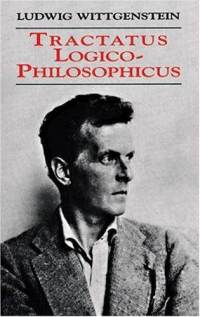ウィットゲンシュタイン 「論理哲学論考」
世界のすべては事実であるから始まり、語ることのできないことは沈黙しなければならないで終わるウィットゲンシュタインの論理哲学論考の始めと終わりの部分、英訳での抜粋です。数学での短い洗練された証明がときとして美しいといわれるのと同様に、それに似た美しさがありますね、怖いようなすごさですね。
英文翻訳 by Pears/McGuinness

ルートヴィヒ・ヨーゼフ・ヨーハン・ウィトゲンシュタイン(独: Ludwig Josef Johann Wittgenstein、1889年4月26日 – 1951年4月29日)
Tractatus Logico-Philosophicus
By Ludwig Wittgenstein
Vorwort (Preface)
Perhaps this book will be understood only by someone who has himself already had the thoughts that are expressed in it—or at least similar thoughts.—So it is not a textbook.—Its purpose would be achieved if it gave pleasure to one person who read and understood it.
The book deals with the problems of philosophy, and shows, I believe, that the reason why these problems are posed is that the logic of our language is misunderstood. The whole sense of the book might be summed up in the following words: what can be said at all can be said clearly, and what we cannot talk about we must pass over in silence.
Thus the aim of the book is to draw a limit to thought, or rather—not to thought, but to the expression of thoughts: for in order to be able to draw a limit to thought, we should have to find both sides of the limit thinkable (i.e. we should have to be able to think what cannot be thought).
It will therefore only be in language that the limit can be drawn, and what lies on the other side of the limit will simply be nonsense.
I do not wish to judge how far my efforts coincide with those of other philosophers. Indeed, what I have written here makes no claim to novelty in detail, and the reason why I give no sources is that it is a matter of indifference to me whether the thoughts that I have had have been anticipated by someone else.
I will only mention that I am indebted to Frege’s great works and of the writings of my friend Mr.Bertrand Russell for much of the stimulation of my thoughts.
If this work has any value, it consists in two things: the first is that thoughts are expressed in it, and on this score the better the thoughts are expressed—the more the nail has been hit on the head—the greater will be its value.—Here I am conscious of having fallen a long way short of what is possible. Simply because my powers are too slight for the accomplishment of the task.—May others come and do it better.
On the other hand the truth of the thoughts that are here communicated seems to me unassailable and definitive. I therefore believe myself to have found, on all essential points, the final solution of the problems. And if I am not mistaken in this belief, then the second thing in which the value of this work consists is that it shows how little is achieved when these problems are solved.
L.W. Vienna, 1918
1
The world is all that is the case.
1.1
The world is the totality of facts, not of things.
1.11
The world is determined by the facts, and by their being all the facts.
1.12
For the totality of facts determines what is the case, and also whatever is not the case.
1.13
The facts in logical space are the world.
1.2
The world divides into facts.
1.21
Each item can be the case or not the case while everything else remains the same.
2
What is the case, the fact, is the existence of states of affairs.
3
A logical picture of facts is a thought.
4
A thought is a proposition with a sense.
5
A proposition is a truth-function of elementary propositions.
(An elementary proposition is a truth-function of itself.)
6
The general form of a truth-function is [p, ξ, N(ξ)].
This is the general form of a proposition.
6.4
All propositions are of equal value.
6.41
The sense of the world must lie outside the world. In the world everything is as it is, and everything happens as it does happen: in it no value exists—and if it did exist, it would have no value.
If there is any value that does have value, it must lie outside the whole sphere of what happens and is the case. For all that happens and is the case is accidental.
What makes it non-accidental cannot lie within the world, since if it did it would itself be accidental.
It must lie outside the world.
6.42
So too it is impossible for there to be propositions of ethics.
Propositions can express nothing that is higher.
6.421
It is clear that ethics cannot be put into words.
Ethics is transcendental.
(Ethics and aesthetics are one and the same.)
6.422
When an ethical law of the form, ‘Thou shalt …’ is laid down, one’s first thought is, ‘And what if I do not do it?’ It is clear, however, that ethics has nothing to do with punishment and reward in the usual sense of the terms. So our question about the consequences of an action must be unimportant.—At least those consequences should not be events. For there must be something right about the question we posed. There must indeed be some kind of ethical reward and ethical punishment, but they must reside in the action itself.
(And it is also clear that the reward must be something pleasant and the punishment something unpleasant.)
6.423
It is impossible to speak about the will in so far as it is the subject of ethical attributes.
And the will as a phenomenon is of interest only to psychology.
6.43
If the good or bad exercise of the will does alter the world, it can alter only the limits of the world, not the facts—not what can be expressed by means of language.
In short the effect must be that it becomes an altogether different world. It must, so to speak, wax and wane as a whole.The world of the happy man is a different one from that of the unhappy man.
6.431
So too at death the world does not alter, but comes to an end.
6.4311
Death is not an event in life: we do not live to experience death.
If we take eternity to mean not infinite temporal duration but timelessness, then eternal life belongs to those who live in the present.
Our life has no end in just the way in which our visual field has no limits.
6.4312
Not only is there no guarantee of the temporal immortality of the human soul, that is to say of its eternal survival after death; but, in any case, this assumption completely fails to accomplish the purpose for which it has always been intended. Or is some riddle solved by my surviving for ever? Is not this eternal life itself as much of a riddle as our present life? The solution of the riddle of life in space and time lies outside space and time.
(It is certainly not the solution of any problems of natural science that is required.)
6.432
How things are in the world is a matter of complete indifference for what is higher. God does not reveal himself in the world.
6.4321
The facts all contribute only to setting the problem, not to its solution.
6.44
It is not how things are in the world that is mystical, but that it exists.
6.45
To view the world sub specie aeterni is to view it as a whole—a limited whole.
Feeling the world as a limited whole—it is this that is mystical.
6.5
When the answer cannot be put into words, neither can the question be put into words.
The riddle does not exist.
If a question can be framed at all, it is also possible to answer it.
6.51
Scepticism is not irrefutable, but obviously nonsensical, when it tries to raise doubts where no questions can be asked.For doubt can exist only where a question exists, a question only where an answer exists, and an answer only where something can be said.
6.52
We feel that even when all possible scientific questions have been answered, the problems of life remain completely untouched. Of course there are then no questions left, and this itself is the answer.
6.521
The solution of the problem of life is seen in the vanishing of the problem.
(Is not this the reason why those who have found after a long period of doubt that the sense of life became clear to them have then been unable to say what constituted that sense?)
6.522
There are, indeed, things that cannot be put into words. They make themselves manifest. They are what is mystical.
6.53
The correct method in philosophy would really be the following: to say nothing except what can be said, i.e. propositions of natural science—i.e. something that has nothing to do with philosophy—and then, whenever someone else wanted to say something metaphysical, to demonstrate to him that he had failed to give a meaning to certain signs in his propositions. Although it would not be satisfying to the other person—he would not have the feeling that we were teaching him philosophy—this method would be the only strictly correct one.
6.54
My propositions serve as elucidations in the following way: anyone who understands me eventually recognizes them as nonsensical, when he has used them—as steps—to climb up beyond them. (He must, so to speak, throw away the ladder after he has climbed up it.)
He must transcend these propositions, and then he will see the world aright.
7
What we cannot speak about we must pass over in silence.
